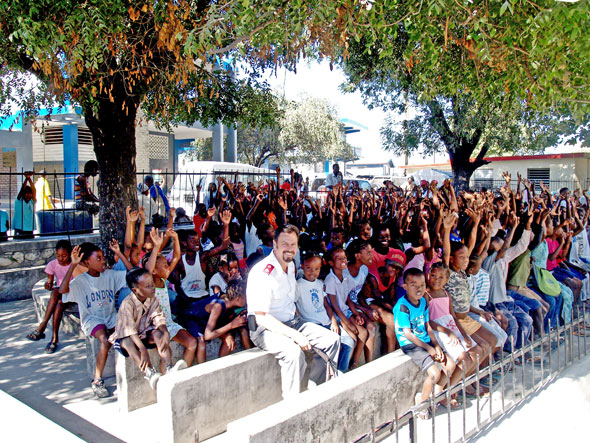 Recommendations coming out of a Salvation Army international strategy conference held in London confirm that The Salvation Army will be heavily and closely involved in rebuilding Haiti well past the conclusion of the current emergency situation caused by massive earthquakes.
Recommendations coming out of a Salvation Army international strategy conference held in London confirm that The Salvation Army will be heavily and closely involved in rebuilding Haiti well past the conclusion of the current emergency situation caused by massive earthquakes.
The conference was attended by a delegation from The Salvation Army's Caribbean Territory, representatives from 10 Salvation Army territories involved in the relief and rebuilding process, personnel from The Salvation Army USA National Headquarters, Salvation Army World Service Office (SAWSO) and The Salvation Army International Headquarters.
After a private meeting with Colonel Onal Castor (Territorial Commander, Caribbean Territory) The Salvation Army's world leader, General Shaw Clifton, in a short address to the delegates, thanked everyone for their 'ready and willing response to the crisis … born out of loving hearts. We cannot begin to measure the impact of your swift responses to the crisis – responses through monetary resources, through the releasing of personnel into the crisis zone and through the supply of food, medical and other essential goods.'
General Clifton said he, along with Commissioner Helen Clifton and Major Richard Gaudion (Private Secretary to the General), were in Haiti just six weeks before the earthquake struck. The hotel they had used is now collapsed.
Speaking in response to what he believes has been some unfair press coverage regarding the Haitian people, the General said: 'Our Haitian Salvationist comrades are gracious and dignified people. They are prayerful, warm in worship, responsive to the gospel, joyous in praise and attentive to the message.'
He said that throughout the Haitian relief effort 'God is ahead of us and will see us through. Best of all, he is with the people of Haiti and will bless them through the selfless devotion of the people throughout the world who gladly and proudly are ready to be called Salvationists.'
Following the General's address leaders of The Salvation Army in the Caribbean presented a paper that outlined the territory's needs. The Territorial Commander stated that as well as the physical rebuilding that is taking place there is also a spiritual awakening. He said that since the earthquake more than 300 people at Port-au-Prince Corps (church) had committed their lives to Jesus for the first time.
In an extensive report the Caribbean Territory's Chief Secretary, Lieut-Colonel Lindsay Rowe, speaking on behalf of the Territorial Commander, emphasised the fact that ministering to people with disabilities is one of the key areas that needs attention. 'Prior to the earthquake it was usual for those with disabilities to struggle and they rarely received an education. There are now many more disabled people.'
He also stated that another vital immediate and long-term need is business development through the generation of employment opportunities for local people.
The emergency phase for The Salvation Army in Haiti is expected to last for another six to nine months. During this time The Salvation Army will continue to care for 20,000 displaced people who are living in cramped camp conditions on a soccer field in Port-au-Prince. Emergency assistance will also be ongoing for those who were adversely affected in Jacmel and Petit Goave.
One of the urgent challenges for The Salvation Army is the relocation of the 20,000 people from its emergency camp to transitional housing. It is hoped this housing will be constructed before the end of the year.
As well as committing to the ongoing emergency relief, at a cost of up to US$500,000 per month, the conference delegates offered funding for community and building projects costing millions of dollars that could take more than five years to complete. Despite the generous offers many more millions of dollars will be needed to complete all that needs to be done and increased partnerships with non-Army donors will be part of the process.
The Salvation Army in Port-au-Prince provides essential services to one of the poorest areas in Haiti and conference delegates strongly expressed their belief that The Salvation Army's facilities needed to be rebuilt as quickly as possible. Most of its buildings have been so badly damaged that they will need to be demolished.
Lieut-Colonel Rowe said that almost all of the city of Port-au-Prince will have to be demolished. It has been estimated that it will take a year just to clear away the rubble. 'This is a sensitive area as there are still many bodies in the rubble,' he added.
During the next few months prioritization of the transitional and long-term projects will take place, applications for further funding will be processed and some projects commenced while emergency relief service continues.
In working through what needs to be done the delegates divided into three groups that covered the emergency phase, community and development projects and infrastructure perspectives. These groups provided the foundational information for the final recommendations.
Photo: Chief Secretary Lieut-Colonel Lindsay Rowe with schoolchildren at the Salvation Army compound in Port-au-Prince









Leave a Comment